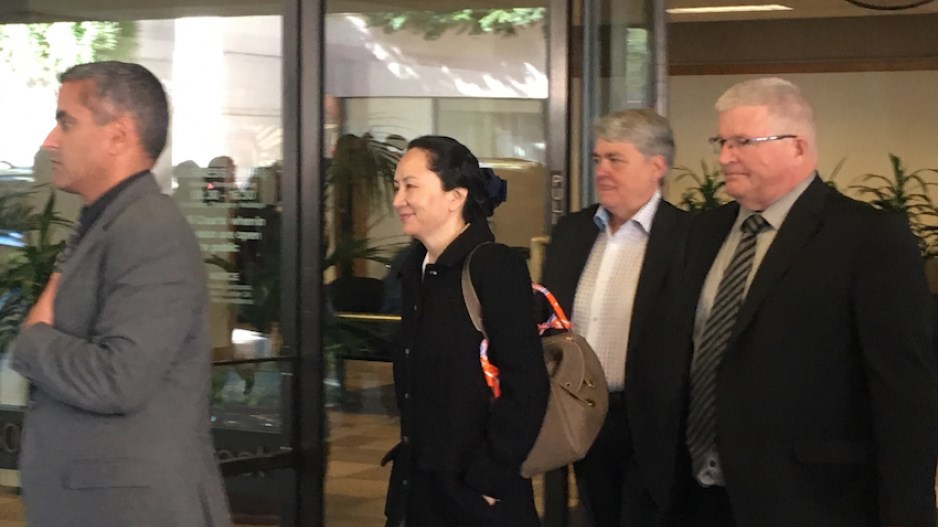The border officer who was among the first to intercept Huawei Technologies Co. Ltd. CFO Meng Wanzhou at Vancouver International Airport two years ago told the court this morning the Huawei executive could have refused to give him her electronic devices when he asked for them upon her arrival.
Canada Border Services Agency officer Sowmith Katragadda said during Thursday’s Meng extradition hearings session under the questioning of defence lawyer Mona Duckett that he greeted the Chinese executive as she got off her plane from Hong Kong and asked for her devices as part of the border entry check process.
Duckett and Meng’s defence contends that the taking of the phones/computers – which they suggested was a seizure – was an attempt by Canadian officials to obtain the devices to aid the FBI in gathering evidence against Meng for her fraud charges in the United States. Duckett was visibly incredulous when Katragadda said the ask was voluntary in naure.
“You are not suggesting that she just handed the devices over to you, are you?” Duckett asked Katragadda, while repeatedly challenging the CBSA officer on whether or not he had the authority to take Meng’s devices at that time.
“She could have said no,” Katragadda said. “... I was not demanding the devices from her. During the course of our operations, we ask many different questions of the travellers [who arrive through YVR]; it was within her right to refuse to answer those questions.”
When Duckett asked if the CBSA would have simply allowed Meng to enter border inspection without surrendering her devices, Katragadda said it might have been an option had the Huawei CFO refused to voluntarily give them to the border officer.
The RCMP had requested the CBSA to take Meng’s devices upon her arrival and place them in a signal-blocking bag to prevent a remote wipe of the contents on the devices. But Katragadda that the CBSA had its own reasons for wanting to take the phones for a potential examination – specifically to see if Meng was admissible into Canada based on national security and espionage concerns (related to the growing scrutiny in the West towards Huawei).
When Duckett suggested to Katragadda that the RCMP – during a meeting on the day of the arrest to discuss the procedure of approaching and inspecting Meng – had advised the CBSA that police officers will stand down and let the border agency conduct its inspection first, the border officer was adamant that the RCMP’s suggestion had no bearings on what the CBSA did with Meng.
“They can suggest whatever they want,” Katragadda said. “But it is our jurisdiction to go first.”
Katragadda also told the court that he believes he had ground to conduct an examination of Meng’s devices in an independent CBSA process, given that Meng’s travel patterns presented to border guards that day – including Latin America, Europe and the Middle East – were consistent with others who have triggered national-security admissibility concerns by visiting certain “source countries” of these concerns.
In the afternoon portion of the hearings, Duckett continued along the lines of one of the defence’s most consistent arguments – Canadian officials’ lack of note-taking in the Meng arrest process.
Duckett noted to Katragadda that – on the specific instance of Meng mentioning her intent was to enter Canada on that day to drop off furniture - none of the CBSA officers on the case that day recorded that information.
The defence has argued that such a widespread lack of note-taking from the four different CBSA officers testifying in the case so far showed more than negligence – rather, it showed a possible effort to conceal information that would be sought later during the extradition hearing process.
“Do you agree that taking notes is a pretty fundamental part of your job?” Duckett asked Katragadda, to which the border officer agreed. “They serve an important function. They help you to refresh your memory in court when asked what has occurred, because the court needs to determine the facts based on the best available evidence.”
Katragadda said that CBSA officer Scott Kirkland – previously testifying in this case – was the official responsible for record-keeping in that instance, and much of Katragadda’s notes came from Kirkland. That, Katragadda argued, is often the standard practice for the CBSA.
Duckett also again went after Canadian officials’ description of the CBSA inspection as routine, noting that Katragadda did not even attempt to open the various boxes Meng had with her during her travels to Vancouver – focusing the evidence effort rather on the electronic devices.
To that, Katragadda said he made a judgment call on what to and not to inspect based on his interactions with Meng during questioning, adding that it had nothing to do with the fact that the RCMP only wanted to get possession of Meng’s electronic devices.
“Part of a field officer’s duty is to exercise judgment on what to inspect,” Katragadda said, admitting he does not know for sure if there were any goods inadmissible into Canada found in those boxes. “We do not open every bag; if we do, the wait times [at the airport for entry] would be unreasonable.”
The hearings resume Friday afternoon.




